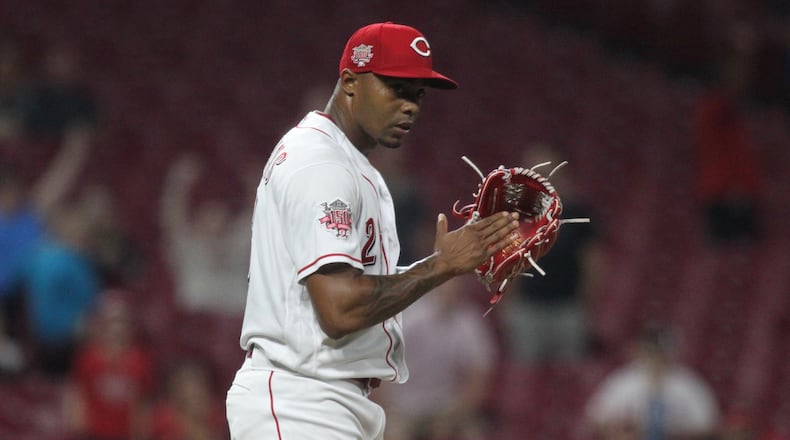That’s what happens to a relief pitcher, a so-called closer, when he loses 11 games. While most fans believe that a relief pitcher losing 11 games in one season is a mortal sin, it happens. And it happens to the best.
Remember Los Angeles Dodgers relief pitcher Mike Marshall, the kinesiology guru? He appeared in 106 games for the 1974 Dodgers and won 15 games. The next season he lost 14.
The all-time record for bullpen losses is owned by Atlanta’s Gene Garber. Remember him? He is the pitcher who struck out Pete Rose to end Rose’s 44-game winning streak and Rose complained, “He pitched me like it was Game Seven of the World Series.”
In 1979 Garber lost 16 games out of the bullpen for the Braves. In 1970, Darold Knowles was 2-and-14 out of the Washington Senators bullpen.
It isn’t even unprecedented with the Reds. J.J. Hoover was 1-and-10 in 2014. Tom Hume lost 10 out of the bullpen in 1980, earning him a much-despised nickname, Boom-Boom Hume. Cool Billy McCool lost 10 out of the Reds bullpen in 1965.
As they say, everybody loves company and Iglesias hasn’t had much of it in his corner lately.
But he had one. And it is the one that counts, his manager, David Bell. It took Bell either strong intestinal fortitude or a death wish for him to point Iglesias to the mound in the ninth inning of the second game of Sunday’s doubleheader in St Louis.
Just days earlier, he gave up walk-off game-winning home run in Miami to the only batter he faced. On Saturday in St. Louis, asked to protect a 2-1 lead, he didn’t retired anybody. He gave up two runs two hits and hit a batter and the Reds lost 3-2.
Now there he was again, on the mound Sunday night, asked to save preserve a 5-3 lead. He went 3-and-0 on the first hitter and there was one large-volume, “Oh, no. Not again,” chant throughout Redsland.
As one fan on Facebook asked, “Has Bell completely lost his marbles.”
Iglesias recovered from the 3-and-0 count to not only strike out Tommy Edman, but he struck out the side.
“He went 3-and-0 and then just locked it in,” said Bell. “I was so happy for him. He has pitched really well in save situations, he really has.”
For his career, Iglesias is 92 saves in 105 chances, an 88 percent conversion rate. He has 28 saves this season, fifth Reds pitcher to record 28 or more saves in three straight seasons.
Save situations aren’t the big problem. And Bell knows it. It is the non-save situations, tie games and when the reds are beind one or two runs late in a game. Those are problems.
“We’ll keep helping him and supporting him,” said Bell. “In the end, they do have to do it on their own. That’s what made me so happy for what he did Sunday. He is out there by himself on the mound and he figured it out. That was a great step for him.”
What is so quizzical and shoulder-shrugging is that even though Iglesias has lost 11 games, his strikeouts-to-walks ratio is better than in the past. Most of his numbers, other than losses, are as good as or better than the last few years. They were eye-popping enough for the Reds to sign him after last season to a three-year $24.125 million deal.
“The saves are there,” said Bell. “I know, it’s the losses. We still believe in him. He is a good pitcher and we need him. He is going to keep getting opportunities.”
That isn’t a vote of confidence, that’s a landslide election for a guy who has struggled mightily.
“For me, he is a guy we want to get the ball to when we have a lead,” said Bell. “We have a few guys like that. He has shown a willingness to pitch in any inning.”
Some questioned that willingness earlier this season when Iglesias said he was being used wrong, that he should only be used for one inning in save situations. That was brusque and brash talk for a young pitcher.
“The fact is, though, that he has been much better in save situations,” said Bell. “He has been so much better and that IS a factor for me.”
Bell realizes that managing a baseball teams is part psychologist, part psychiatrist and part counsellor, in addition to running a baseball game.
“We’re trying to win games and to do that I try to put guys in the best position to succeed,” he said. “I might see a better spot for Iglesias in the eighth, he has pitched better in save situations. I’m trying to balance that out.
“The best part of my job is trying to deal with people,” he added. “They’re humans. I’m trying to balance that with the best way to win games. Nothing is more important than that and that’s what made me so happy for Iglesias Sunday.”
Just as a couple of bad days doesn’t wreck a season, one outstanding day doesn’t resurrect it. Iglesias, as are all pitchers, is only as good (or bad) as his next climb up the pitcher’s mound.
About the Author
